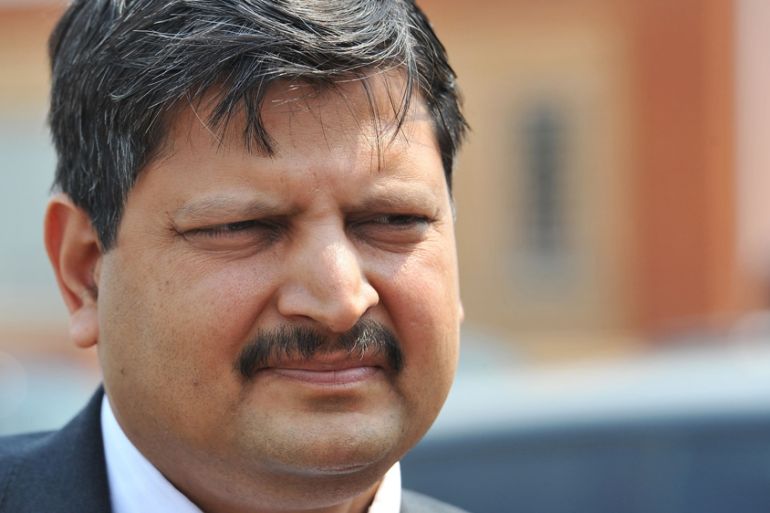India carries out raids against Gupta brothers
Indian-born billionaire family accused of exploiting ties to former South African President Zuma to win state contracts.

New Delhi – Residences and offices of the high-profile Gupta business family, who are being probed for allegations of influence-peddling in the South African government, have been raided by Indian tax authorities.
“The investigation is ongoing, and we will divulge all information after the probe is completed,” Harish Kumar, a senior tax official in the Indian state of Uttar Pradesh, told Al Jazeera.
Keep reading
list of 4 itemsCan Jacob Zuma and his MK party unseat the ANC in South Africa’s election?
South Africa deploys army to avert unrest after trucks torched
Heckling of President Ramaphosa triggers backlash in ruling ANC
The Indian-born billionaire Gupta brothers, Atul, Ajay and Rajesh, have been accused by the South African opposition and anti-corruption campaigners of allegedly exploiting their close alliance with former President Jacob Zuma, to unduly influence government affairs and win big state contracts for their family businesses.
The Gupta family and Zuma have denied the allegations.
Zuma’s successor and South Africa’s new President Cyril Ramaphosa, after his inauguration last month, promised a crackdown on corruption in the country.
Indian tax authorities on Tuesday conducted multiple raids in the remote town of Saharanpur in the northern state of Uttar Pradesh, and one of the properties belonging to the three Gupta brothers in the Indian capital, New Delhi.
A tax official, who was at the ancestral home of the Guptas, confirmed the raids but refused to divulge further details.
Hemindra Hazari, an Indian financial research analyst and banking expert says he is not surprised by the raids.
“This Indian action could be based on an official request sent by the South Africa government, to try to retrieve some of the money that the Guptas have allegedly taken out of South Africa. The other reason is also that the Bank of Baroda, which is a majority government-owned bank has been acutely impacted because of the Gupta connection,” Hazari told Al Jazeera.
The Guptas are clients of India’s Bank of Baroda, the third-biggest state-run lender in India. Earlier last month, the bank pulled the plug on its South African business, an exit reportedly resulting from the Gupta scandal.
“The Gupta connection has been a blot on the Bank of Baroda,” Hazari added. “This is huge negative publicity. The government wants to pressurise the Guptas for having done this to one of its premier banks, with a very old solid presence in one of the leading economies in the African continent.”
![South African authorities also raided the Gupta family compound in Johannesburg in February [EPA]](/wp-content/uploads/2018/02/7977184d3d044715879bdeab84dd84b3_18.jpeg)
‘Fugitive from justice’
South Africa’s main commercial banks have all cut ties with the Guptas, citing risk to their reputation.
An Indian businessman in New Delhi who is close to the Gupta family, speaking on condition of anonymity, called the raids “pressure tactics”.
“This is unfair and won’t work. What exact offences are they investigating? There are allegations against them of wrongdoing in South Africa. Why are Indian tax authorities raiding their ancestral home here as is being reported in certain sections of the media?” he said.
Guptas’ funding of the construction of a proposed multi-million dollar Hindu temple in Saharanpur is the mainstay of the investigations, according to a report in the Indian daily, Times of India.
Indian tax authorities are eager to block the passage of “illicit money” into India earned by the Gupta brothers outside the country, Amrendra Kumar, a senior tax official told Reuters news agency.
In February, one of the brothers, Ajay Gupta, was declared “a fugitive from justice” by South Africa’s chief prosecutor and South African police raided Gupta properties in the country as part of anti-graft probe.
In India’s Himalayan state of Uttarakhand, where the family owns a palatial residence, the two brothers Ajay and Atul have been provided security by the state government.
Ajay was reportedly in the state capital Dehradun last month when African National Congress leader Jacob Zuma resigned as president of South Africa.
India has historical and deep-rooted political ties with South Africa, dating back to the period during which Mahatma Gandhi started his political movement against colonial rule in South Africa over a century ago. India was also one of the strongest supporters of the anti-apartheid movement.